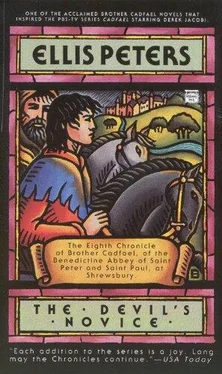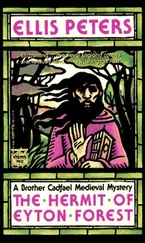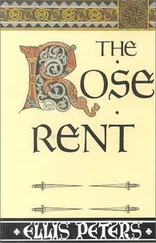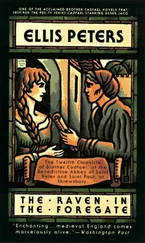Ellis Peters - The Devil's Novice
Здесь есть возможность читать онлайн «Ellis Peters - The Devil's Novice» весь текст электронной книги совершенно бесплатно (целиком полную версию без сокращений). В некоторых случаях можно слушать аудио, скачать через торрент в формате fb2 и присутствует краткое содержание. Жанр: Старинная литература, на английском языке. Описание произведения, (предисловие) а так же отзывы посетителей доступны на портале библиотеки ЛибКат.
- Название:The Devil's Novice
- Автор:
- Жанр:
- Год:неизвестен
- ISBN:нет данных
- Рейтинг книги:3 / 5. Голосов: 1
-
Избранное:Добавить в избранное
- Отзывы:
-
Ваша оценка:
- 60
- 1
- 2
- 3
- 4
- 5
The Devil's Novice: краткое содержание, описание и аннотация
Предлагаем к чтению аннотацию, описание, краткое содержание или предисловие (зависит от того, что написал сам автор книги «The Devil's Novice»). Если вы не нашли необходимую информацию о книге — напишите в комментариях, мы постараемся отыскать её.
The Devil's Novice — читать онлайн бесплатно полную книгу (весь текст) целиком
Ниже представлен текст книги, разбитый по страницам. Система сохранения места последней прочитанной страницы, позволяет с удобством читать онлайн бесплатно книгу «The Devil's Novice», без необходимости каждый раз заново искать на чём Вы остановились. Поставьте закладку, и сможете в любой момент перейти на страницу, на которой закончили чтение.
Интервал:
Закладка:
“And Canon Eluard wants him found?”
“Dead or alive,” said Hugh grimly. “For so will Henry want him found, and an account paid by someone for his price, for he valued him.”
“And the search is laid upon you?” said Cadfael.
“Not in such short terms, no. Eluard is a fair-minded man, he takes a part of the load upon him, and doesn’t grudge. But this shire is my business, under the sheriff, and I pick up my share of the burden. Here is a scholar and a cleric vanished where my writ runs. That I do not like,” said Hugh, in the ominously soft voice that had a silver lustre about it like bared steel.
Cadfael came to the question that was uppermost in his mind. “And why, then, having the witness of Aspley and all his house at his disposal, did Canon Eluard feel it needful to turn back these few miles to Shrewsbury?” But already he knew the answer.
“Because, my friend, you have here the younger son of that house, new in his novitiate. He is thorough, this Canon Eluard. He wants word from even the stray from that tribe. Who knows which of all that manor may not have noticed the one thing needful?”
It was a piercing thought; it stuck in Cadfael’s mind, quivering like a dart. Who knows, indeed? “He has not questioned the boy yet?”
“No, he would not disrupt the evening offices for such a matter—nor his good supper, either,” added Hugh with a brief grin. “But tomorrow he’ll have him into the guests’ parlour and go over the affair with him, before he goes on southward to join the king at Westminster, and prompt him to go and make sure of Chester and Roumare, while he can.”
“And you will be present at that meeting,” said Cadfael with certainty.
“I shall be present. I need to know whatever any man can tell me to the point, if a man has vanished by foul means within my jurisdiction. This is now as much my business as it is Eluard’s.”
“You’ll tell me,” said Cadfael confidently, “what the lad has to say, and how he bears himself?”
“I’ll tell you,” said Hugh, and rose to take his leave.
As it turned out, Meriet bore himself with stoical calm during that interview in the parlour, in the presence of Abbot Radulfus, Canon Eluard and Hugh Beringar, the powers here of both church and state. He answered questions simply and directly, without apparent hesitation.
Yes, he had been present when Master Clemence came to break his journey at Aspley. No, he had not been expected, he came unheralded, but the house of his kinsmen was open to him whenever he would. No, he had not been there more than once before as a guest, some years ago, he was now a man of affairs, and kept about his lord’s person. Yes, Meriet himself had stabled the guest’s horse, and groomed, watered and fed him, while the women had made Master Clemence welcome within. He was the son of a cousin of Meriet’s mother, who was some two years dead now—the Norman side of the family. And his entertainment? The best they could lay before him in food and drink, music after the supper, and one more guest at the table, the daughter of the neighbouring manor who was affianced to Meriet’s elder brother Nigel. Meriet spoke of the occasion with wide-open eyes and clear, still countenance.
“Did Master Clemence say what his errand was?” asked Hugh suddenly. “Tell where he was bound and for what purpose?”
“He said he was on the bishop of Winchester’s business. I don’t recall that he said more than that while I was there. But there was music after I left the hall, and they were still seated. I went to see that all was done properly in the stable. He may have said more to my father.”
“And in the morning?” asked Canon Eluard.
“We had all things ready to serve him when he rose, for he said he must be in the saddle early. My father and Fremund, our steward, with two grooms, rode with him the first mile of his way, and I, and the servants, and Isouda …”
“Isouda?” said Hugh, pricking his ears at a new name. Meriet had passed by the mention of his brother’s betrothed without naming her.
“She is not my sister, she is heiress to the manor of Foriet, that borders ours on the southern side. My father is her guardian and manages her lands, and she lives with us.” A younger sister of small account, his tone said, for once quite unguarded. “She was with us to watch Master Clemence from our doors with all honour, as is due.”
“And you saw no more of him?”
“I did not go with them. But my father rode a piece more than is needful, for courtesy, and left him on a good track.”
Hugh had still one more question. “You tended his horse. What like was it?”
“A fine beast, not above three years old, and mettlesome.” Meriet’s voice kindled into enthusiasm, “A tall dark bay, with white blaze on his face from forehead to nose, and two white forefeet.”
Noteworthy enough, then, to be readily recognised when found, and moreover, to be a prize for someone. “If somebody wanted the man out of this world, for whatever reason,” said Hugh to Cadfael afterwards in the herb garden, “he would still have a very good use for such a horse as that. And somewhere between here and Whitchurch that beast must be, and where he is there’ll be threads to take up and follow. If the worst comes to it, a dead man can be hidden, but a live horse is going to come within some curious soul’s sight, sooner or later, and sooner or later I shall get wind of it.”
Cadfael was hanging up under the eaves of his hut the rustling bunches of herbs newly dried out at the end of the summer, but he was giving his full attention to Hugh’s report at the same time. Meriet had been dismissed without, on the face of it, adding anything to what Canon Eluard had already elicited from the rest of the Aspley household. Peter Clemence had come and gone in good health, well-mounted, and with the protection of the bishop of Winchester’s formidable name about him. He had been escorted civilly a mile on his way. And vanished.
“Give me, if you can, the lad’s answers in his very words,” requested Cadfael. “Where there’s nothing of interest to be found in the content, it’s worth taking a close look at the manner.”
Hugh had an excellent memory, and reproduced Meriet’s replies even to the intonation. “But there’s nothing there, barring a very good description of the horse. Every question he answered and still told us nothing, since he knows nothing.”
“Ah, but he did not answer every question,” said Cadfael. “And I think he may have told us a few notable things, though whether they have any bearing on Master Clemence’s vanishing seems dubious. Canon Eluard asked him: ‘And you saw no more of him?’ And the lad said: ‘I did not go with them.’ But he did not say he had seen no more of the departed guest. And again, when he spoke of the servants and this Foriet girl, all gathered to speed the departure with him, he did not say ‘and my brother.’ Nor did he say that his brother had ridden with the escort.”
“All true,” agreed Hugh, not greatly impressed. “But none of these need mean anything at all. Very few of us watch every word, to leave no possible detail in doubt.”
“That I grant. Yet it does no harm to note such small things, and wonder. A man not accustomed to lying, but brought up against the need, will evade if he can. Well, if you find your horse in some stable thirty miles or more from here, there’ll be no need for you or me to probe behind every word young Meriet speaks, for the hunt will have outrun him and all his family. And they can forget Peter Clemence—barring the occasional Mass, perhaps, for a kinsman’s soul.”
Canon Eluard departed for London, secretary, groom, baggage and all, bent on urging King Stephen to pay a diplomatic visit to the north before Christmas, and secure his interest with the two powerful brothers who ruled there almost from coast to coast. Ranulf of Chester and William of Roumare had elected to spend the feast at Lincoln with their ladies, and a little judicious flattery and the dispensing of a modest gift or two might bring in a handsome harvest. The canon had paved the way already, and meant to make the return journey in the king’s party.
Читать дальшеИнтервал:
Закладка:
Похожие книги на «The Devil's Novice»
Представляем Вашему вниманию похожие книги на «The Devil's Novice» списком для выбора. Мы отобрали схожую по названию и смыслу литературу в надежде предоставить читателям больше вариантов отыскать новые, интересные, ещё непрочитанные произведения.
Обсуждение, отзывы о книге «The Devil's Novice» и просто собственные мнения читателей. Оставьте ваши комментарии, напишите, что Вы думаете о произведении, его смысле или главных героях. Укажите что конкретно понравилось, а что нет, и почему Вы так считаете.












